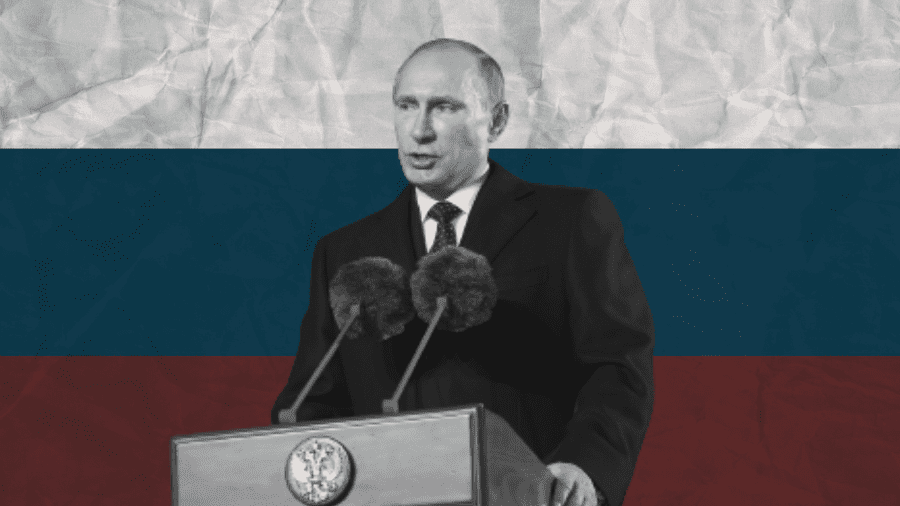This article originally appeared in the Globe and Mail.
By Aurel Braun, March 13, 2024
One of the jokes that helped sustain people during the dark days of Soviet rule under Leonid Brezhnev was about elections: A panicked aide rushes into the Soviet leader’s office and announces, “Comrade Brezhnev, I have terrible news. Someone broke into the Kremlin vault and stole next year’s election results.”
Vladimir Putin, like the Soviet Communist party, is equally preordained to win Russia’s coming presidential elections.
Mr. Putin will forgo the usual, blatantly false 99.8-per-cent vote gathered by the Communist Party in Soviet times, but he has not been any less brazen or brutal in fixing the process. Particularly, during his past decade in office he has ensured that any credible opposition leader was murdered, jailed, exiled, or marginalized. He has stifled civil society, suffocated virtually all opposition media and restricted or censored social media. There is nothing hybrid about this authoritarian personalist regime.
It is hard to see how this election would have credibility except amongst the most gullible or craven in the West, or those relatively few willing to suspend belief within Russia. The Putin leadership understands this, yet it is investing considerable time and effort in carrying through this process, and preparing for the celebrations of the predetermined outcome. The most relevant question perhaps should be: Why proceed with these constitutional pretensions and have this election?
Leaders with Mr. Putin’s more recent record would usually avoid an election – even a bogus one. His claim to be the guardian of national values and sovereign safety – and his claim to being a perennial winner – ring utterly hollow under the weight of rampant corrosive corruption, endless war and tectonic strategic shifts against Russia. The demise of communism in Eastern Europe and the disintegration of the Soviet Union have taught us that reality eventually catches up to political artifice.
Under Mr. Putin, Russia has become a state increasingly defined by gangsterism at home and terrorism abroad (just this week, a top aide to Alexey Navalny was brutally attacked with a meat hammer outside his home in Lithuania. The country’s intelligence services have said the Kremlin is “likely” behind the violent assault).
Yet there are several indicators that the Putinite system is much more fragile than generally assumed. Dictatorships that seem strong and stable, and then suddenly collapse, have shown that disparate fissures coalesce in unpredictable ways and can become politically deadly for a regime. Such fissures now abound in Russia.
The dissent and extraordinary bravery of the late Mr. Navalny and his supporters is crucial and goes far beyond the number of dissidents in the country. Such dissent eventually permeates society and Mr. Navalny’s death may make it even more potent. He might not have been killed on the Kremlin’s orders in February, but he was murdered by instalment after he had been poisoned, jailed, exiled and isolated over the years. He and his movement present a grave danger to Putinism. Their defiance, ridicule of Mr. Putin’s Ukraine aggression as “a stupid war,” and labelling of the party supporting him as the “Party of Crooks and Thieves” delegitimizes the regime. Mr. Navalny enjoined his supporters to continue the fight after his death in creative ways, and the thousands who defied the Kremlin by attending his funeral may be only a sampling of what is looming. Further, the regime’s panicked and feckless response to Yevgeny Prigozhin and his Wagner Group’s brief mutiny in June, 2023, was another indicator of both the corruption permeating the military and the fragility of the regime that his assassination did not resolve.
The war in Ukraine, despite some recent tactical gains by Russia, has become “a meat grinder,” wherein Moscow’s forces suffered at least 315,000 dead and wounded by the end of 2023 alone. Several hundred thousand of the most educated young Russian men have fled abroad to avoid the draft.
In February, 2022, when Mr. Putin essentially demanded a reversal of NATO’s enlargement while attempting nuclear blackmail, he inadvertently induced game-changing developments. Suddenly, neutral Finland and Sweden were far more interested in NATO membership. Their acceptance into the alliance has effectively turned the Baltic Sea into a NATO lake. There is a new unity among European NATO members and a remarkable surge in defence commitments. In 2024, most member states, crucially including Germany, will for the first time this century meet or exceed NATO’s 2-per-cent-of-GDP defence expenditure target. Yes, Ukraine aid is stalled in Congress and a possible Trump presidency hovers in the background, but Russia’s military is facing a strategic nightmare.
Internal gangsterism, external terrorism, symbiotic associations with rogue states, and increasing vassalage to China are Putinism’s real legacies. So again, why hold sham elections for a seemingly supine but conscious population? The answer may be: precisely because Mr. Putin actually recognizes the population’s awareness of the ways in which things should be different. And so, he wants to ram home his gangsterism’s ultimate message of obedience: “You are helpless and resistance is hopeless.”
Aurel Braun is a professor of political science and international relations at the University of Toronto and an associate at Harvard University’s Davis Center.






